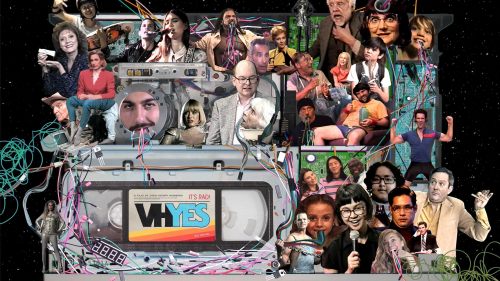Fantastic Fest Review: UNDER THE SILVER LAKE Is The Inane Ramblings Of A Madman
Under the Silver Lake is a remarkably frustrating experience, and it’s an even more difficult film to adequately review. It’s a film characterized by incredible ambition with some gems of thoughtful ingenuity, but it also feels designed to specifically curtail the inevitable criticism against itself, encouraging a mentality that if you “get it” you are in on some great cinematic mystery, even if there may or may not be anything there to understand. And yet, for as insufferable as that pretention can be, it’s leveled out with some genuine insight and humor that makes the experience worthwhile, even as you realize you’re going to have that one friend who will never shut up about the inevitable hours of YouTube videos that are going to attempt deconstructing this thing.
The story follows Sam (Andrew Garfield), a Hollywood bum on the verge of being kicked out of his apartment and listlessly getting by on a diet of alcohol. A dog killer is stalking the neighborhood, and the news reports that a famous billionaire has gone missing. This sense of fear and isolation leads Sam to reach out to his neighbor Sarah (Riley Keough), and after a night of getting stoned to old movies, they part ways with the promise that they will hang out again the next day. But Sarah is suddenly gone when Sam goes to check up on her, and with less than a week left until his eviction, Sam decides he needs to figure out what happened to Sarah, with only a mysterious symbol left on the wall of her apartment to guide him.
Sam is a flawed, neurotic character, and he sees the world in terms of conspiratorial connections and guiding patterns in pop culture, so the ways in which his investigation develops are reflective of this scatterbrained, deviant perception of reality. This neo-noir by way of delusion enables some truly killer gags, not the least of which are due to a unique physical performance from Garfield, and the frame is constantly littered with codes, ciphers, and references to classic Hollywood that can be as minor as Easter eggs to convolutedly vital to the plot. This is ultimately a story about the value that our media has in our lives in relation to the Hollywood moral cesspool that creates it, and when it’s leaning into the resonance of that love-hate relationship with our culture, Under the Silver Lake is a challenging yet rewarding experience.
However, that purposeful insanity is the film’s double-edged sword, cutting against its legitimately thoughtful observations with apparent tangents, plot cul-de-sacs, and full on nonsensical diatribes that are never differentiated as having any more or less meaning than the pieces of the mystery that actually interconnect. This can be as annoyingly innocuous as a plot thread that never finds resolution or as egregious as the film’s persistent portrayal of women as sex objects and male arm-candy, which only holds commentative meaning if you squint really hard at it. It gives the film a sense of being absurd for absurdity’s sake, but it’s framed as a mystery to be solved that likely doesn’t have any real answers, either intended by writer-director David Robert Mitchell or otherwise.
I came out of Under the Silver Lake feeling net positive, but it’s also a film that alternately engages and enrages, and the conclusion is unsatisfying for its obliqueness despite clearly being designed to provoke thoughtfulness. This is a film designed for pedants, plot and sight gag deconstructionists that will place more value in “unlocking” the supposed secrets buried within than on finding value in the film’s emotional truth, relating to Sam’s asinine dot-connecting rather than seeing it for the illness it clearly is. It’s a gorgeously shot, inventively designed, amusingly acted, occasionally brilliant film, but the pretense of muddling nonsense with intellectual rigor means that it will forever be impossible to consider Under the Silver Lake as anything other than an exercise in smugness from a creative mind that has only the barest grasp on the theses it posits.



